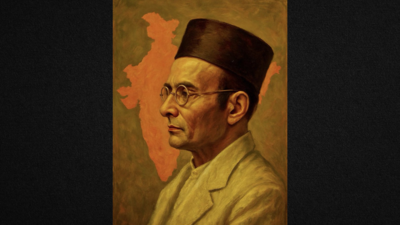ARTICLE AD BOX

Vinayak Damodar Savarkar (Image: @drsinghraj/X)
Vinayak Damodar Savarkar, or Veer Savarkar as people call him, was a freedom fighter and social reformer of his time. And every year, Veer Savarkar Jayanti is observed on May 28 to commemorate his birth anniversary.Born in 1883 in Bhagur, Maharashtra, Savarkar played a key role in India's struggle for independence and is remembered for his bold thoughts, fearless actions, and strong ideological foundation that continue to influence Indian politics and society today.Savarkar is usually described as a revolutionary, a poet, a historian, and a political thinker. He was deeply inspired by the stories of bravery from Indian history and decided early on to dedicate his life to the cause of India's freedom.
He went to London to study law, and during his time there, he became actively involved in revolutionary activities. He founded the ‘Free India Society’ with other intellectuals and wrote extensively against British colonial rule.
Books by Veer Savarkar
One of Savarkar’s most well-known historical works is ‘The First War of Indian Independence 1857’, originally titled ‘1857 Ka Swatantraya Samar’. In this book, he challenged the British narrative that the 1857 uprising was merely a mutiny by disgruntled soldiers.
Instead, Savarkar argued that it was the first collective effort of Indians to overthrow British rule. The book was banned by the British government, but it inspired many revolutionaries in India and abroad.Another significant contribution by Savarkar is his book ‘Hindutva’. In this work, he laid the ideological foundation of Hindutva, defining it not merely as a religious identity but as a cultural and national identity.
And according to Savarkar, Hindutva was a collective identity of Indian people, and was based on a shared heritage, culture, and historical experience.One of Savarkar’s most praised and criticised books is this one. ‘Hindu Pad-Padshahi’ is about the rise and fall of identities, of having certain forms of rule, and establishing a Kingdom based on a common identity and culture, and shared values. Savarkar’s aim with this book was to instill pride in Indian heritage and motivate people to fight for their nation’s independence.Another amazing book by Savarkar is ‘Mera Aajeevan Karavas’, where he wrote about his experiences in the Cellular Jail in Andaman and Nicobar Islands. Arrested for his activities, Savarkar was sentenced to life imprisonment by the British and sent to the dreaded ‘Kala Pani’ saza. This book talked about the conditions of inmates, the suffering they had to endure, and the torture they went through on the island.
Quotes by Savarkar
“Relative अहिंसा is a virtue; but absolute अहिंसा is a crime”“We yield to none in our love, admiration, and respect for the Buddha, the Dharma, and the Sangha.
They are all ours. Their glories are ours, and ours are their failures.”“Oh, Motherland, sacrifice for you is like life; living without you is death.”“After all, there is throughout this world, so far as man is concerned, but a single race—the human race—kept alive by one common blood, the human blood.”“Untouchability is the curse that has shadowed and darkened the history of our nation. Rightly so, nothing can justify the practice of untouchability.”“A country that does not recognise its heroes, its martyrs, and its warriors is doomed to decay.”



.png)
.png)
.png)
















 1 week ago
7
1 week ago
7









 English (US) ·
English (US) ·